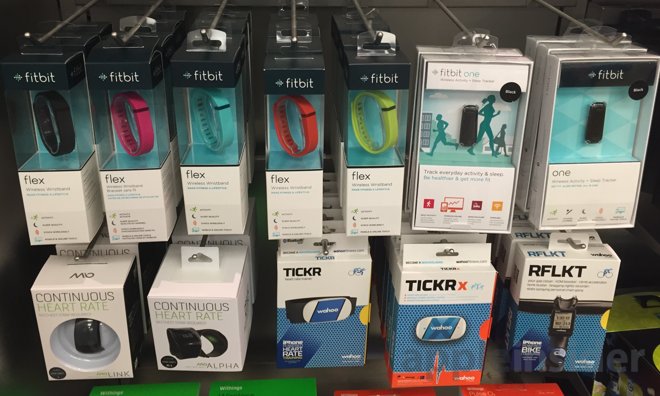
Wearable fitness device maker Fitbit was hit with a class-action lawsuit Wednesday over claims that its wristbands provide inaccurate–and in some cases, dangerously misleading–heart rate recordings.
In the suit, Fitbit owners from California, Colorado, and Wisconsin allege that the heart rate tracking in the Charge HR and the Surge, two products that came to market last year, is inaccurate by a “significant margin,” especially during periods of vigorous exercise. The plaintiffs say that despite Fitbit’s high-visibility advertising touting the heart rate tracking in its products, the monitors “do not and cannot accurately record wearers’ heart rates”, much less “count every beat.”
“Fitbit marketed these products through aggressive and widespread advertising to consumers who were not only deceived in the devices’ true functionality, but who also were put at a safety risk by trusting the Fitbit Heart Rate Monitors’ inaccurate measurement,” Robert Klonoff, one of the customers’ lawyers, said in a statement. “Many thousands of consumers paid a premium to get accurate heart rate monitors, and instead got devices that do not work as promised.”
One claimant in the lawsuit said her Fitbit Charge HR dramatically understated her heart rate during a personal training session in June 2015. She said her personal trainer manually recorded her heart rate at 160 beats per minute (bpm), a rate approaching the maximum safe limit for someone her age, but her Fitbit device indicated that her heart rate was only 82 bpm — in the normal range for someone at rest. When she complained, Fitbit refused to refund her, she said.
“[I]f she had continued to rely on her inaccurate PurePulse Tracker, she may well have exceeded [her maximum recommended heart rate], thereby jeopardizing her health and safety,” the lawsuit stated.
Another claimant, who said his doctor had advised him not to exceed a heart rate of 160 bpm, found that his Fitbit Surge device was as much as 25 bpm below what other heart rate monitors said. That margin of error renders the device effectively useless, the suit says.

Fitbit’s wrist-based heart monitoring devices may not be as accurate as the company claims, according to a class action lawsuit filed on behalf of consumers.
“Scores of customer complaints confirm these are not isolated incidents,” states the complaint, which was brought as a class action lawsuit on behalf of other customers. The suit seeks to compel Fitbit to cease deceptive marketing and sales of wearable devices with “PurePulse” heart-rate monitors, as well as pay damages to the plaintiffs.
Fitbit, the world’s bestselling fitness tracker manufacturer, sells two products that claim to monitor users’ heart rates, in addition to tracking steps, calories burned and sleep quality. The Charge HR wristband and Surge fitness watch both have a “PurePulse” sensor on the underside of the tracker. Rather than actually detecting heartbeats, the sensor uses LED lights that reflect onto the skin to detect changes in blood volume, then applies “finely tuned algorithms” to “measure heart rate automatically and continuously”, according to the company’s website.
This kind of monitoring device can be very useful for a variety of health- and fitness-related goals, helping consumers achieve and maintain proper intensity during exercise, track progress over time, and stay motivated. For people with certain health conditions, this type of heart-rate monitoring can also be essential to staying safe.
Traditionally, accurate heart rate monitoring has required a chest strap, which can be uncomfortable, distracting, and difficult to clean. Fitbit claimed to have circumvented these problems with its new wrist monitors, which were marketed with slogans such as “Every beat counts” and “Know your heart”, and its website claims to allow owners to “check real time heart rate”.

A new class action lawsuit states that advertisements like the one above are misleading consumers about the product’s ability to accurately measure heart rate.
“Not only are accurate heart readings important for those engaging in fitness, they can be critical to the health and well-being of people whose medical conditions require them to maintain (or not exceed) a certain heart rate,” the lawsuit states. “The defect in the PurePulse Trackers presents a safety hazard because [consumers] could jeopardize their health by relying on the inaccurate heart rate readings and potentially achieving dangerous heart rates.”
In response to the suit, Fitbit said that while its trackers provide better heart rate data than cardio machines and other gym equipment, they “are not intended to be scientific or medical devices.”
The PurePulse tracker at the center of the lawsuit also is used in Fitbit’s new Blaze smartwatch-like fitness tracker, which was unveiled earlier this week to a mixed reception and a decline in Fitbit’s stock price, as analysts compared it unfavorably to the similar-looking Apple Watch.
This is not the first legal challenge for Fitbit. “The company is already in the midst of several suits against rival wearable-device maker Jawbone over accusations of poaching workers and stealing trade secrets. Fitbit issued a recall in 2014 after customers complained of rashes after wearing the devices and a lawsuit over misleading advertising,” writes CNET’s Terry Collins.
